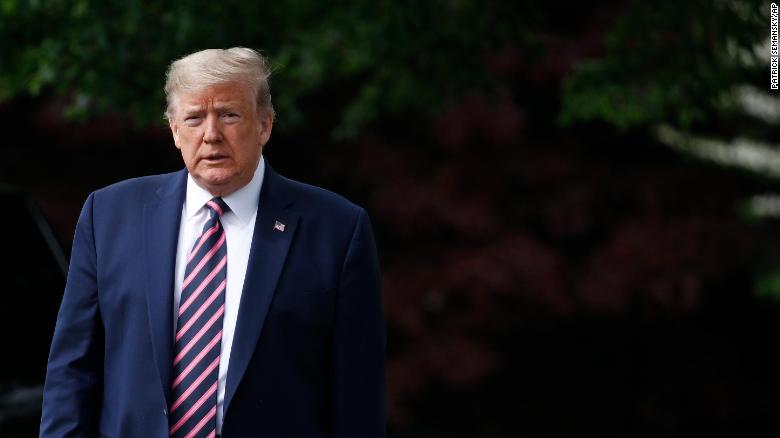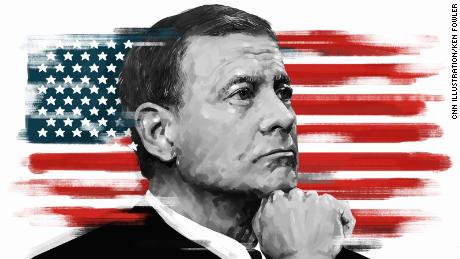Washington (CNN)"We're asking for temporary presidential immunity."
That was the direct request from Jay Sekulow, President Donald Trump's personal attorney, to the Supreme Court on Tuesday in the historic lawsuit over turning over the President's tax returns to a grand jury.
The idea is fairly simple: that the President, while in office, shouldn't be subject to ordinary -- or even extraordinary -- investigations or any criminal process. After all, as Sekulow noted, there's a lot happening in the world on a daily basis, including a pandemic that has shut down the country.
Trump has often claimed "presidential harassment" whether in regard to congressional investigations, the media or lawsuits against him and the White House. In the legal sphere, it manifests itself into the simple question: Does a president get to dictate his own legal terms? Or, more dramatically, is he above the law?
This is an issue that comes up repeatedly with Trump and was in the forefront this week. And courts, it is clear, are struggling with the issue, and the Supreme Court will likely soon set some ground rules for challenging a president.
Thursday, a federal appeals court didn't buy the idea that Trump's power is unlimited.
"Although the Constitution entrusts the President with the enormous responsibility of faithfully executing the law ... the notion that the President is vested with unreviewable power to both execute and interpret the law is foreign to our system of government," wrote Judge Diana Gribbon Motz of the 4th US Circuit Court of Appeals.
"The Framers, concerned about the corrosive effect of power and animated by fears of unduly blending government powers, dispersed the authority to enforce the law and the authority to interpret it," Motz added. "To hold otherwise would mean that the President alone has the ultimate authority to interpret what the Constitution means."
The 4th Circuit case addresses Trump's attempt to stop a lawsuit by Maryland and the District of Columbia challenging his ownership of the Trump International Hotel in DC, saying he's unfairly profiting and hurting other businesses because of his office.
The ruling was 9-6, and the losing side did not hold back either.
"I make but one point -- that the federal judiciary, no less than the President, is subject to the law. And here the federal judiciary has sorely overstepped its proper bounds," Judge J. Harvie Wilkinson wrote for the minority, before making many more points in a lengthy dissent.
"The majority is using a wholly novel and nakedly political cause of action to pave the path for a litigative assault upon this and future Presidents and for an ascendant judicial supervisory role over Presidential action."
Lawsuits, Wilkinson wrote, will abound.
"It opens the door to litigation as a tool of harassment of a coordinate branch with notions of competitor standing so wide and injury-in-fact so loose that litigants can virtually haul the Presidency into court at their pleasure," Wilkinson wrote in his dissent.
At the Supreme Court on Tuesday, another Trump attorney, Patrick Strawbridge, continued the theme of potential harassment.
"Unlike Congress, the President is never in recess. And these types of subpoenas are -- are -- are going to be particularly troublesome and burdensome," he said during the oral arguments held over telephone and broadcast live.
Douglas Letter, general counsel for the Democratic-controlled House of Representatives, struggled to come up with a red line. Justice Samuel Alito, one of the high court's five conservatives, was clearly disappointed.
"In your view," Alito asked, "there is really no protection against the use of congressional subpoenas for the purpose of preventing the harassment of a president because the only requirement is that the subpoena be relevant to a conceivable legislative purpose, and you can't think of a single example of a subpoena that wouldn't meet that test?"
Chief Justice John Roberts, as always the pivotal vote at the Supreme Court, asked what to do given that lawsuits and subpoenas could in theory fly from anywhere.
"So how do you balance that? You've got, in this case, three different House committees seeking subpoenas. You've got the district attorney in New York," Roberts asked. "You know, depending upon party composition of different bodies in the future, you might have the Senate joining in. How do you measure harassment in a case like that?"
Letter acknowledged that at some point, actions against a president could be overwhelming, although he noted that the House and New York's subpoenas are to third-party banks and accounting firms, not Trump himself.
"I think what you would do is, if these were subpoenas from the House and the Senate, a massive number of them ... it would affect the ability of the White House and the President to function," Letter said. "There's no doubt about that."
What it might interfere with is now the court's job to determine.









